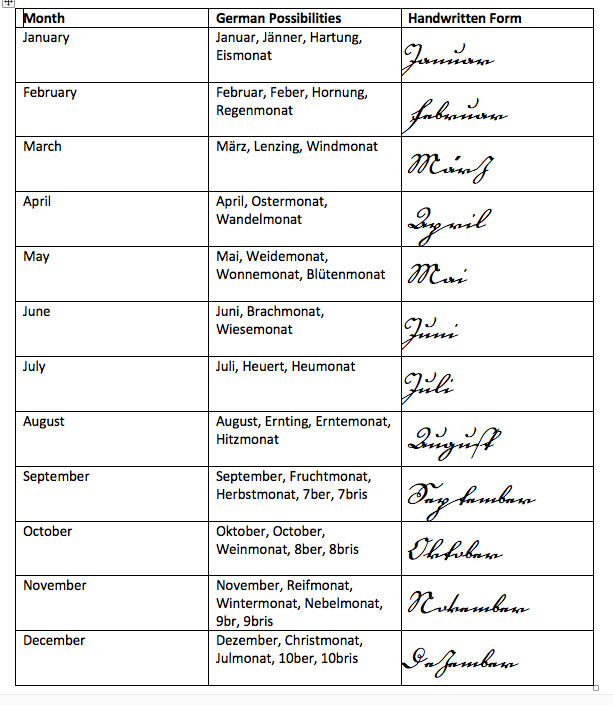When analyzing your ancestors’ documents, you are likely looking for two things – events and dates. Being able to read these dates, therefore, is of the utmost importance for your genealogy research. In an ideal world, all you would need to do would be to memorize the 12 German words for the months (German: Monate) of the year. and you’d be good to go. But because we are talking about documents of the past, there were often multiple words used for the same month, depending on the time, the region, the scribe, etc. So it’s important to be familiar with all these variations. But no worries – I’ve got you covered!


Two different words for January – Jänner and Januar
In the table below, I’ve summarized for you the different possibilities of German words you may run into for each month. The “regular” – and most common – translation of the month in German is first, and this word is provided for you in the old handwriting as well. The words that follow are the less common – but no less important – variations, as sometimes this will be the only month word you find in your ancestor’s record.
You’ll notice that September – December are denoted 7, 8, 9, and 10ber/bris (you may also see December written as Xbris). This numbering of the months dates back to the time of the Romans, when the calendar began in March, making September the 7th month of the year. So don’t get confused and think 7bris means July! Most of the other month words are descriptions – March as “Wind Month” and October as “Wine Month” for example – and are rather interesting in their translations. So if you run into one of these less common words, just refer to this table, and you should be good to go. Happy transcribing!
The Ultimate List of Months in German Genealogy


2 Responses
it is the same in every langues.
September is harvest month (fruchtmonat) and also the month that autumn starts (Herbnst monat).
And 7br oder 7bris = latin which wa used in the old days.
Thanks for the handy tabulation of Months found in German records. However if your ancestor lived near the French border, other names might also apply.
Most of my German family research has been near Zweibrucken in the Rheinland-Pfalz area, so when a birth record of the year 1800 instead said something like “… month of Frucidor in Year 7 of the Republic” my translation came to a halt.
It turns out that when Napolean took over those areas he instituted record keeping based on the new French Republic with year One beginning 22 September (the autumnal equinox) of 1792.
This is mind bending, but Wikipedia explains it, in part, as follows:
“The revolutionary system was designed in part to remove all religious and royalist influences from the calendar …. It was used in government records in France and other areas under French rule….
…. on 22 September 1792 when the Republic was proclaimed and the …. Convention decided that all public documents would be dated Year I of the French Republic.
…. “Months
(Names of Months during French occupation of Rheinland-Pfalz and other conquered areas of Europe:)
The Republican calendar year began the day the autumnal equinox occurred in Paris, and had twelve months of 30 days each, which were given new names based on nature, principally having to do with the prevailing weather in and around Paris and sometimes evoking the Medieval Labors of the Months. …..
• Autumn:
o Vendémiaire (from French vendange, derived from Latin vindemia, “vintage”), starting 22, 23, or 24 September
o Brumaire (from French brume, “mist”), starting 22, 23, or 24 October
o Frimaire (from French frimas, “frost”), starting 21, 22, or 23 November
• Winter:
o Nivôse (from Latin nivosus, “snowy”), starting 21, 22, or 23 December
o Pluviôse (from French pluvieux, derived from Latin pluvius, “rainy”), starting 20, 21, or 22 January
o Ventôse (from French venteux, derived from Latin ventosus, “windy”), starting 19, 20, or 21 February
• Spring:
o Germinal (from French germination), starting 20 or 21 March
o Floréal (from French fleur, derived from Latin flos, “flower”), starting 20 or 21 April
o Prairial (from French prairie, “meadow”), starting 20 or 21 May
• Summer:
o Messidor (from Latin messis, “harvest”), starting 19 or 20 June
o Thermidor (or Fervidor*) (from Greek thermon, “summer heat”), starting 19 or 20 July
o Fructidor (from Latin fructus, “fruit”), starting 18 or 19 August “
[ End of Wikipedia text ]